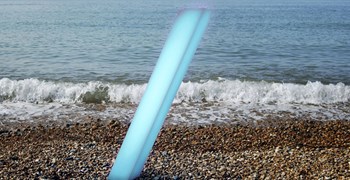Culture Minister slaps export ban on John Logie Baird TV treasure trove
This article originally appeared on Culture24.
Culture Minister hopes buyer can be found for "hugely important" archive including earliest TV transmission to US
 Materials relating to John Logie Baird’s first-ever transmission of trans-Atlantic television pictures have been temporarily barred from export© DCMS
Materials relating to John Logie Baird’s first-ever transmission of trans-Atlantic television pictures have been temporarily barred from export© DCMSThe “treasure trove” of items has been temporarily barred for export by Culture Minister Ed Vaizey to provide a last chance to keep the archive in the UK if a British buyer can be found in the time permitted.
UK buyers have until September 28 to raise the required £78,750 asking price.
Among the archive's riches is a gramophone “Phonovision” disc containing an early video recording, made on September 20 1927 depicting images of ‘Stookie Bill’ - one of Baird’s famous ventriloquist dummies.
The earliest Phonovision disc in existence, the object also lays claim to being the world’s earliest surviving video recording.
Between November 1926 and April 1927, Logie Baird and his assistant, Benjamin Clapp, developed the idea of rigging up a receiving station and television receiver in America and transmitting pictures of Stookie Bill over telephone lines from Baird’s laboratories in London to Clapp’s house in Surrey. From there, they were sent by wireless to the East Coast of the United States of America via a powerful transmitter station.
The archive also includes Clapp’s radio log books for the US receiving station and his amateur radio station (GK2Z) used in the transmission, together with related paper ephemera including notes containing the first ever use of the acronym ‘TV’ for television.
“Britain led the world in the development of television technology during the 1920’s, all due to the pioneering work of John Logie Baird and his colleagues,” said Vaizey.
“It belongs in Britain where it would be of huge importance for the study of the history of television, and I hope a UK buyer will come forward to save it for the nation.”
The Culture Minister took the decision to defer granting an export licence for the items following a recommendation by the Reviewing Committee on the Export of Works of Art and Objects of Cultural Interest, administered by Arts Council England.
Describing the Phonovision disc and the notes connected with the world first of a transantlantic video recording as examples of “British ingenuity and invention at the highest level”, RCEWA Member Christopher Rowell said: “The excitement of the achievement rests in these objects, which we hope will remain in this country as a permanent testament to Logie Baird and his team.
"Their departure abroad would also be a serious loss to scholarship.”
The deferral period may be extended until December 28 if a serious intention to raise funds to purchase the items materialises.
What do you think? Leave a comment below.
More from Culture24's Science and Nature section:
Guinness World Record for pendulum clock vindicates John Harrison 250 years on
National Football Museum gets technological upgrade as new exhibition opens with robots and gadgets galore
Ten of the best scientific images of the year from the Wellcome Image Awards












